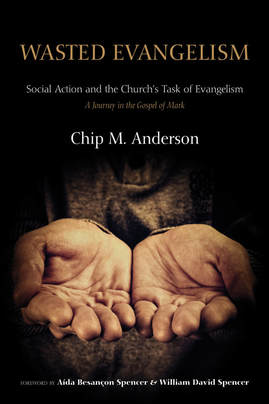Wasted top reads in 2018: Books that made significant impact on my thinking and ministry vision12/31/2018  I read a lot. Sometimes more than one book at a time. At the end of each year, I post the ten or so top books that have been influential to me, which I think other Christians and those in church ministry would benefit from reading as well. I don’t list journal articles, but I read a lot of these as well. But since you all will more likely buy a book than dig up an academic journal, I give you the most significant books I have read in 2018. I don’t have to agree with everything an author has written to be influenced—to rethink, to expand my thoughts on church, the faith, the gospel, mission, evangelism, discipleship, culture, justice, etc. These eleven books make the list because their subject matter will have lasting value on me. And, I believe would greatly help you on your discipleship journey as well. They are not in any particular order; more or less the order I read them throughout 2018. Nonetheless, I strongly suggest the two books by Richard Beck and Michael Goheen’s book on Newbigin’s “Missionary Ecclesiology” as very important and significant reads for those in church ministry. And, I highly recommend Stephen Backhouse's book on Kierkegaard is a fun (enjoyable) read that will help you think about your faith out of the box (out of the Christendom box the church finds itself in at this time). Enjoy. Church and Its Vocation: Lesslie Newbigin’s Missionary Ecclesiology by Michael W. Goheen Church Forsaken: Practicing Presence in Neglected Neighborhoods by Jonathan Brooks, Stranger God: Meeting Jesus in Disguise by Richard Beck Mañana: Christian Theology from a Hispanic Perspective by Justo L. González Loving the Poor, Saving the Rich: Wealth, Poverty, and Early Christian Formation by Helen Rhee Delivered from the Elements of the World: Atonement, Justification, Mission by Peter J. Leithart Saved by Faith and Hospitality by Joshua W. Jipp Exegeting the City: What You Need to Know About Church Planting in the City Today by Sean Benesh Urban Hinterlands: Planting the Gospel in Uncool Places by Sean Benesh Kierkegaard: A Single Life by Stephen Backhouse Unclean: Meditations on Purity, Hospitality, and Mortality by Richard Beck
0 Comments
Sometimes Facebook is so detrimental to my Christian vision. Post after post causes me to see how so many young, confessing Christian 20- and 30-somethings are getting so, I'll say it, domesticated; that is, their assuming the cultural position of comfort, upward mobility, adverse to risk, non-follow-through with prior Christian callings, "I believe this is what God wants for mes," and "God told mes" and now ready to settle for an ordinary life, heck an ordinary church-life. Striving for it actually. Don't get me wrong, I fully realize that an ordinary life is more in line with God's called will, but I mean here by "ordinary" is "what's socially and culturally expected" and "how can I raise a family unless . . .?" and just plain, fitting into the realm of American life and contemporary church-life. This somewhat saddens me . . . I keep thinking it must be hard to apply what John wrote in 1 John 2:15-17:
Hard to apply when it doesn't look like the world around the 20- and 30-somethings is passing away, but needs to be planned for for family, security, and eventually, retirement (a wholly unbiblical concept bytheway--sorry to all my good and faithful friends who are retired). I feel like we are living at a time somewhat like the king of Israel that was told destruction was coming, but humbled himself just enough to forestall judgement during his days and passed it on to his sons (when destruction did, eventually come). "O, Lord, just not in my days, let the destruction come, during another generation because its my turn, our turn to live and enjoy life." Two years ago, I listened to a former president of Crown College (my alma mater) answer the question: "What aren't we training our future Christian leaders that we should be training them for?" Without hesitation his answer: "We are not training them to endure persecution." As I have now turned 61 and heading into my last stretch, I am more and more realizing how lulled as Christians, we, especially the young, the up and coming Christian and church leaders, have become. How settled we are, planning, striving at being lulled. Just not in our generation, O Lord, not in ours. It's our turn to enjoy life.
 Living out, both as individuals and as a gathered-church, the Sermon of the Mount, should appear as a threat to the social and cultural status quo and to those invested in maintaining this status quo. As such, Sermon on the Mount living cannot help but challenge the way things are. Interestingly, in the Sermon on the Mount there is no mention of ranting on public platforms as the means to challenge the powers, no mention of protesting or boycotting, no calls for platforms to leverage any form of power, no voice nor stones–only light and salt (i.e., living in community, that is as church); rather we are not to practice our righteousness hypocritically for the applause and/or affirmation of others (and you don't get invited to be an A-list Christian speaker without that applause), not to judge, and are to do to others how you want to be treated (no matter how you are treated by them). Living out the Sermon on the Mount is meant for church, a social group whose allegiance is to the risen Lord Jesus, not to be attempted solo, for apart from the gospel at work in the flock of God, encouraging one another and loving one another, such living is impossible. The Sermon on the Mount is not possible for the State to legislate by law apart from granting power to some to enforce by forms of punishment and violence. Surprisingly we seem to be doing the opposite. We love the opposite, because we like power, whether the power of the crowd (i.e., the mob) or the power of platformed applause. Sermon on the Mount living is the opposite of power. And, we are impatient. Sermon on the Mount living demands patience. And, we trust our leverage and platforms. Sermon on the Mount living calls for extraordinary, faithful trust in God's ability to work in the affairs of humankind, and thus to be often hidden and away from the applause of others. It is no wonder that the first two book volumes produced by the church were on "Patience" (i.e., Tertullian and Cyprian). No one, especially Jesus, said this Sermon on the Mount living is easy. This is why the gate is narrow to this life, the life imagined by the Beatitudes. We, as church and, especially, our individual elite-celebrity Christians, seek to use the wide and broad way (judging, law and thus State enforced punishment and retaliation, encouraging hatred and others to judge, and non-forgiveness, and the building of power and leverage (the complete opposite of the Sermon on the Mount), which leads to destruction. And just in case we didn't get that the Sermon on the Mount is actually God's word to his church, we are to build on the Rock of this Word and not the sands shifting power. God, forgive me for not living out the Sermon on the Mount and for being all too willing to call the church and other Christians to live out the wide and broad way to get our way in this world. *Check out as a part of this thread, Matthew 6:1-18 as a reflection on the Beatitudes >> Click Here
 Lesslie Newbigin “believed that the ‘whole thrust of the 20th century [last century] rediscovery of the missionary nature of the church is lost if it does not lead to a radical re-conception of what it means to be a local congregation of God’s people.’ And so he frequently expressed his conviction that the local congregation is the primary reality of the church and therefore the only possible hermeneutic of the gospel” (Michael W. Goheen, The Church and Its Vocation: Lessie Newbigin’s Missionary Ecclesiology, p. 108). Amen and amen. But this means getting our “local” ecclesiology right (as in biblical). We confuse our form for church, yet our form (and its institution) will determine much in how we (and the public) understand what we mean by the gospel. We tend to read back our form and way of doing church into the New Testament (a bad hermeneutic!). We need to think more deeply about ecclesiology and the local, gathered-church. Frankly, we need a "radical re-conception" of the nature, purpose, and meaning of the local church, what I prefer to call, the local, gathered-church.  If you offer mercy and care to the poor so you are seen by others for their applause, for your own glory, honor, status . . . if you pray in ways so you may be seen and admired by others . . . if you fast to be recognized and esteemed by others, you are a hypocrite like the others. And, so, you are, then, not poor in spirit, not one who mourns, not meek and you do not thirst and hunger for justice, nor are you merciful, nor clean of heart, nor a peace-maker, thus, you will not receive reward from the Father who is in heaven. The kingdom is not yours. You shall not be comforted. You shall not inherent the earth. You will not be satisfied. You shall not receive mercy. You shall not see God. And, you will not be called “sons of God.” Seeking the applause of others for caring for the needy and seeking to be seen praying and fasting by others most certainly means you will not be persecuted for righteousness’ sake. Neither will you be reviled, and rather than having all kinds of evil uttered against you, you will be lauded with accolades and honor and status, and, therefore, you will not receive God’s gracious heavenly rewards, for you will have already received your reward. You are “shining” so others will give you glory rather than give God glory. And, in the end, you will not be able to claim that you have been cheated, for you will have been paid in full by the glory (applause, recognition, honor, status) given to you by others.
Almost all works on the relationship between evangelism and social action, most books on the church and the poor, and every book out there on the subject of Christians and social justice are argued from experience, a theological bent, a political aisle, or a church experience. Although such platforms have value and have their place, there are few, if any, volumes that seek an exegetical foundation for the author’s conclusion: a what does the text imply? My Wasted Evangelism is an exegetical argument for understanding that social action can be a component of biblical evangelism and ought to be an element in a church’s task of evangelism.
Please consider purchasing a copy of my Wasted Evangelism: Social Action and the Church's Task of Evangelism, a deep, exegetical read into the Gospel of Mark. All royalties go to support our church planting in the Hill community of New Haven, CT. The book and its e-formats can be found on Amazon, Barns'n Noble (and most other online book distributors) or directly through the publisher, Wipf & Stock directly. Here are some excepts from each of the chapters: Samples |
AuthorChip M. Anderson, advocate for biblical social action; pastor of an urban church plant in the Hill neighborhood of New Haven, CT; husband, father, author, former Greek & NT professor; and, 19 years involved with social action. Archives
February 2024
Categories
All
|
Pages |
More Pages |
|


 RSS Feed
RSS Feed